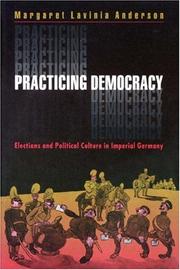| Listing 1 - 1 of 1 |
Sort by
|

ISBN: 0691048541 0691048533 0691229538 9780691229539 Year: 2000 Publisher: Princeton, N.J. Princeton University Press
Abstract | Keywords | Export | Availability | Bookmark
 Loading...
Loading...Choose an application
- Reference Manager
- EndNote
- RefWorks (Direct export to RefWorks)
"What happens when manhood suffrage, a radically egalitarian institution, gets introduced into a deeply hierarchical society? In her sweeping history of Imperial Germany's electoral culture, Anderson shows how the sudden opportunity to "practice" democracy in 1867 opened up a free space in the land of Kaisers, generals, and Junkers. Originally designed to make voters susceptible to manipulation by the authorities, the suffrage's unintended consequence was to enmesh its participants in ever more democratic procedures and practices. The result was the growth of an increasingly democratic culture in the decades before 1914. Explicit comparisons with Britain, France, and America give us a vivid picture of the coercive pressures--from employers, clergy, and communities--that German voters faced, but also of the legalistic culture that shielded them from the fraud, bribery, and violence so characteristic of other early "franchise regimes." We emerge with a new sense that Germans were in no way less modern in the practice of democratic politics. Anderson, in fact, argues convincingly against the widely accepted notion that it was pre-war Germany's lack of democratic values and experience that ultimately led to Weimar's failure and the Third Reich. Practicing Democracy is a surprising reinterpretation of nineteenth- and early twentieth-century Germany and will engage historians concerned with the question of Germany's "special path" to modernity; sociologists interested in obedience, popular mobilization, and civil society; political scientists debating the relative role of institutions versus culture in the transition to democracy. By showing how political activity shaped and was shaped by the experiences of ordinary men and women, it conveys the excitement of democratic politics"--
Authoritarianism --- Democracy --- Elections --- Electoral politics --- Franchise --- Polls --- Political science --- Politics, Practical --- Plebiscite --- Political campaigns --- Representative government and representation --- Self-government --- Equality --- Republics --- Authority --- History --- Germany --- Politics and government --- History of Germany and Austria --- anno 1800-1899 --- anno 1910-1919 --- Elections. --- Democracy. --- Authoritarianism. --- Germany. --- Activism. --- Alsace-Lorraine. --- Amendment. --- Antisemitism. --- Backwardness. --- Ballot box. --- Ballot. --- Bribery. --- Bureaucrat. --- By-election. --- Calculation. --- Chairman. --- Civil service. --- Class conflict. --- Clergy. --- Comrade. --- Conservative Party (UK). --- Criticism. --- Deliberation. --- Democratization. --- East Prussia. --- Election commission. --- Election law. --- Election. --- Electoral district. --- Electoral fraud. --- Embarrassment. --- Employment. --- Federal republic. --- Fraud. --- Friedrich Naumann. --- Germans. --- Gerrymandering. --- Hostility. --- Ideology. --- Imperial Government. --- Imperial election. --- Incumbent. --- Injunction. --- Institution. --- Intimidation. --- Journeyman. --- Kulturkampf. --- Laborer. --- Landtag. --- Legislation. --- Legislator. --- Legislature. --- Local government. --- Loyalty. --- Mittelstand. --- Multi-party system. --- Newspaper. --- Ostracism. --- Otto von Bismarck. --- Party system. --- Political Catholicism. --- Political campaign. --- Political culture. --- Political party. --- Political science. --- Political spectrum. --- Politician. --- Politics. --- Polling place. --- Poor relief. --- Precinct. --- Prerogative. --- Proclamation. --- Proportional representation. --- Protest. --- Protestantism. --- Provision (contracting). --- Prussia. --- Public administration. --- Radicalism (historical). --- Regime. --- Requirement. --- Resignation. --- Robert von Puttkamer. --- Secret ballot. --- Simplicissimus. --- Skepticism. --- Social democracy. --- Socialist law. --- Society of Jesus. --- Suffrage. --- Supporter. --- Tariff. --- Tax. --- The Other Hand. --- Trade union. --- Uncertainty. --- Universal suffrage. --- Upper Silesia. --- Voting. --- Weimar Republic. --- West Prussia. --- Workplace. --- Alemania --- Ashkenaz --- BRD --- Bu̇gd Naĭramdakh German Uls --- Bundesrepublik Deutschland --- Deguo --- 德国 --- Deutsches Reich --- Deutschland --- Doitsu --- Doitsu Renpō Kyōwakoku --- Federal Republic of Germany --- Federalʹna Respublika Nimechchyny --- FRN --- Gėrman --- German Uls --- Герман Улс --- Germania --- Germanii︠a︡ --- Germanyah --- Gjermani --- Grossdeutsches Reich --- Jirmānīya --- KhBNGU --- Kholboony Bu̇gd Naĭramdakh German Uls --- Nimechchyna --- Repoblika Federalin'i Alemana --- República de Alemania --- República Federal de Alemania --- Republika Federal Alemmana --- Vācijā --- Veĭmarskai︠a︡ Respublika --- Weimar Republic --- Weimarer Republik --- ХБНГУ --- Германия --- جرمانيا --- ドイツ --- ドイツ連邦共和国 --- ドイツ レンポウ キョウワコク --- Germany (East) --- Germany (Territory under Allied occupation, 1945-1955) --- Germany (Territory under Allied occupation, 1945-1955 : British Zone) --- Germany (Territory under Allied occupation, 1945-1955 : French Zone) --- Germany (Territory under Allied occupation, 1945-1955 : Russian Zone) --- Germany (Territory under Allied occupation, 1945-1955 : U.S. Zone) --- Germany (West) --- Holy Roman Empire --- Europe
| Listing 1 - 1 of 1 |
Sort by
|

 Search
Search Feedback
Feedback About UniCat
About UniCat  Help
Help News
News